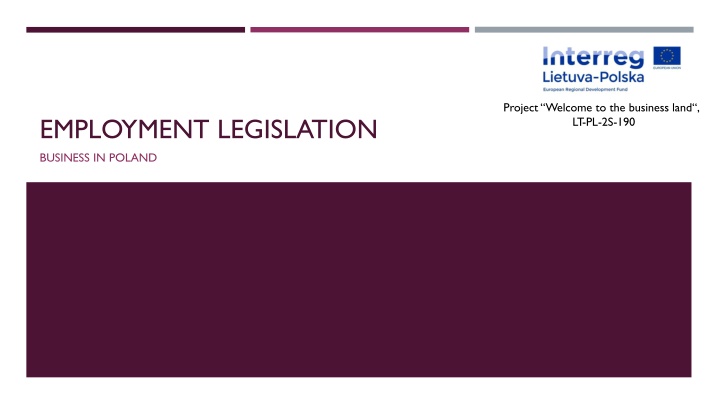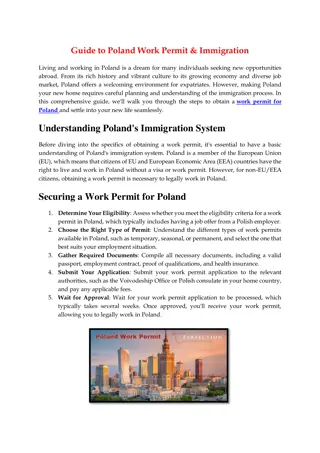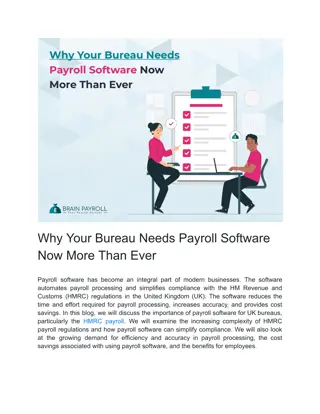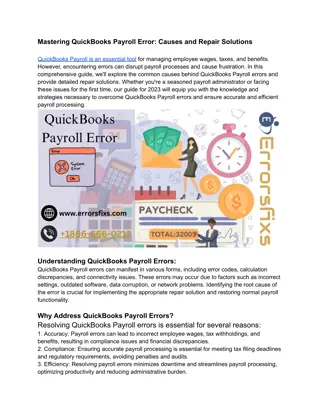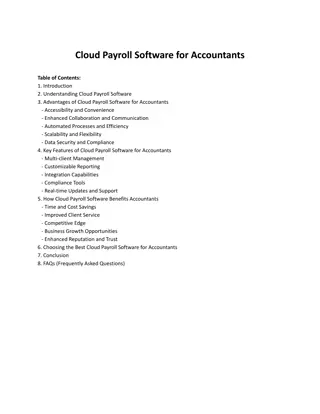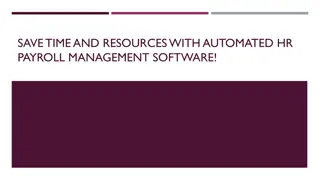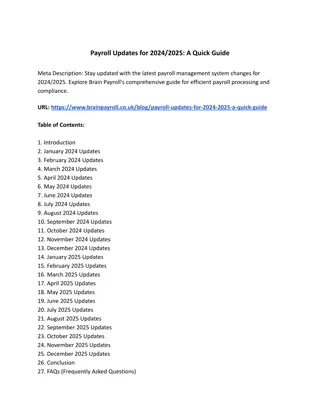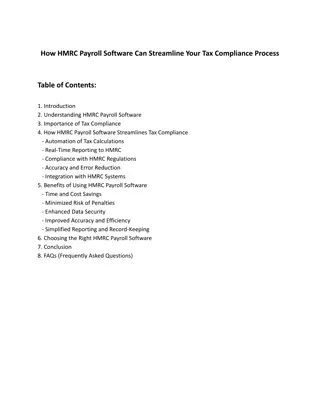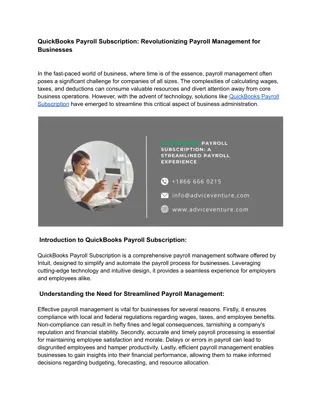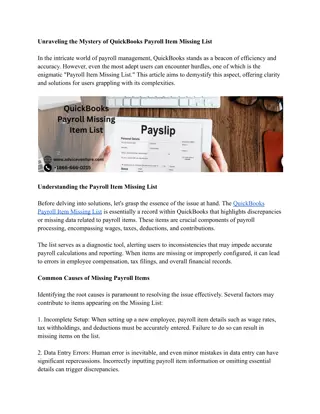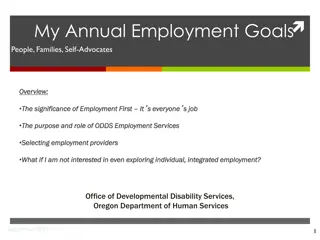Employment Legislation and Payroll Administration in Poland
This informative content covers essential aspects of employment legislation, payroll administration, employer and company obligations, and social and health insurance contributions in Poland. It includes details on minimum wage, working hours, social security premiums, tax obligations, HR administration processes, and insurance contributions. The content provides a comprehensive guide for businesses operating in Poland, outlining important regulations and requirements to ensure compliance and effective workforce management.
Uploaded on Apr 13, 2025 | 2 Views
Download Presentation

Please find below an Image/Link to download the presentation.
The content on the website is provided AS IS for your information and personal use only. It may not be sold, licensed, or shared on other websites without obtaining consent from the author.If you encounter any issues during the download, it is possible that the publisher has removed the file from their server.
You are allowed to download the files provided on this website for personal or commercial use, subject to the condition that they are used lawfully. All files are the property of their respective owners.
The content on the website is provided AS IS for your information and personal use only. It may not be sold, licensed, or shared on other websites without obtaining consent from the author.
E N D
Presentation Transcript
Project Welcome to the business land, LT-PL-2S-190 EMPLOYMENT LEGISLATION BUSINESS IN POLAND
PAYROLL IN POLAND National MinimumWage Starting from 1 January 2018 the minimum gross wage in Poland is 2100 PLN The minimum gross hourly rate in Poland is 13,70 PLN per hour WorkingTime 8 hours/day 40 hours in a five-day settlement week Components of social security premiums paid by employer and employee Retirement, Disability, Accident and Sickness contributions Health Insurance
EMPLOYER OBLIGATIONS PAYROLLADMINISTRATION Registration In the Social Security Authority (ZUS) within 7 days from the date of employment of the first employee Of the employees with Social Security Authority within 7 days since the date of employment Reporting on a monthly basis Preparing and submitting monthly declarations to ZUS as well paying the liability until 15th day of each month for the preceding month. Paying the income tax liability until 20th day of each month for the preceding month Annual filing deadline 31 January Employer Annual Tax Returns (PIT-4R, PIT-8AR) 28 February Annual Information about Income and Withholding Tax for employees (PIT-11, PIT-40) 30 April Employee tax return declaration (PIT-37)
COMPANY OBLIGATIONS RELATEDTO HR ADMINISTRATION PROCESSES Coordination of medical check up for new employees in order to confirm that the employee is allowed to perform his work on an appropriate position before the start of the employment, then periodical and controlling Coordination of Hygiene and Safety trainings (BHP) for new employees no later than on the first day of employment, and periodically later on Creating and maintaining personal files for each of employee in accordance with Polish Labour Law Employment contract signed on the first day of employment but before admitting to work and acquaintance with internal regulations
SOCIALAND HEALTH INSURANCE CONTRIBUTIONS IN POLAND (2017) Type of insurance Contributions paid on gross earnings up to annual cap of PLN 127 890,00 Contributions paid on gross earnings above annual cap of PLN 127 890,00 Total % rate Employer s part Employee s part Total % rate Employer s part Employee s part Pension 19.52% 9.76% 9.76% - - - Disability 8.00% 6.5% 1.50% - - - Sickness 2.45% - 2.45% 2.45% - 2.45% Accident 1.80%* 1.80%* - 1.80%* 1.80%* - from 0.40% to 3.60%** from 0.40% to 3.60%** from 0.40% to 3.60%** from 0.40% to 3.60%** Labour fund 2.45% 2.45% - 2.45% 2.45% - Employee guaranteed beenfits fund 0.10% 0.10% - 0.10% 0.10% - Total social insurance contributions from 32.92% to 36.12% from 19.21% to 22.41% 13.71% from 5.4% to 8.6% from 2.95% to 6.15% 2.45% Health 9.00% - 9.00% 9.00% - 9.00% Total health insurance contributions 9.00% - 9.00% 9.00% - 9.00%
PERSONAL INCOMETAX In general,the Polish personal income tax ( PIT ) system is of a progressive nature and currently provides for two rates: 18% and 32%,in excess of a personal allowance (variables) Income (in PLN) Income tax (in PLN) Up to 85 528 18% minus the variables amount exempt from tax Above 85 528 14 839,02 + 32% of the surplus over 85 528 The tax advances should be calculated using the appropriate tax rates and paid to the relevant tax office by the 20th day of following month. The higher tax rate is calculated from the next month after the month the employee s income has reached the limit of 85 528 PLN. Reporting obligations cover also preparing annual information (PIT-11 form to be issued by the end of February of the year following the given fiscal year).According to the general rule annual information should be filed electronically.
PFRON THE STATE FUND FOR REHABILITATION OF THE DISABLED If the employment in the Company is at least 25 employees per full-time job (monthly average employment) the PFRON registration is mandatory Preparing the declaration and submitting to PFRON as well paying the liability - until 20th day of the following month after the month of obligation is required The employers are exempt from these payments obligation to PFRON when: o The employment rate of disabled people is at least 6% (this index is the average monthly percentage of disabled persons in total employment in FTE), o When the company is in liquidation or is a declared bankrupt.
SICKNESS, HOLIDAY LEAVE, MATERNITY LEAVE Sickness As per the Polish Social Security Coverage, for the first 33 days of sick leave in a given calendar year the employee receives a sickness remuneration at a rate of 80% of the sickness benefit basis. After 33 days of sickness absence the employee receives the sickness allowance at the same 80% rate of the sickness benefit basis for each day of absence (in some cases 100%) covered by the Social Security Authority form the Sickness Insurance of Social Security Coverage. The length of holiday leave 20 days - if the employee has been employed for less than 10 years 26 days - if the employee has been employed for more than 10 years Benefits related to maternity leave The total length of maternity leave and leave for parents depends on how many children were born and equals: 52 weeks in case of giving birth to one child Basic maternity leave 20 weeks Leave for parents 32 weeks 2 children (31+34) = 65, 3 children ( 33+34)=67 etc.
TYPES OF EMPLOYMENT CONTRACTS Regular employment contracts (umowa o prac ) Those contracts are regulated by the Labour Law. Once signed, an employee is entitled to paid holidays, maternity and childcare leave, severance pay in the event of collective redundancies and the dole lasting 6 months after leaving your work. In addition to that, if you are planning to take mortgage you would be considered a person with stable income by a bank. However, this is the most expensive contract from the point of view of an employer, and therefore harder to obtain. There are a few types of regular contracts: 1. For a trial period (contract for a trial period of no more than three months). 2. For a fixed period (a third subsequent fixed-term contract is signed, it is deemed to have become an indefinite term contract). 3. For the time of completion of a specified task. 4. For an indefinite period of time. 5. To replace an employee in the event of his or her justified absence from work; the employer can hire another worker under a fixed term employment contract for the period of absence.
TYPES OF EMPLOYMENT CONTRACTS Civil law contracts These contracts are regulated by the Civil Code, which differ from the above mainly in that they specify a piece of work to be done within a defined period of time, quite often without setting working hours; the most popular ones, among many other, are the following two: 1. Commission contract (umowa zlecenie) This type of contract does not impose daily or weekly time limits for performing the work, does not necessitate the payment of overtime, does not require the creation of internal rules of employment, and does not give the mandatory social protection. 2. Contract of specific work (umowa o dzie o) This type of contract is drawn for an achievement of a specific result. Contracts to perform a specified task or work are frequently concluded because they are not subject to social security contributions. However, if a firm concludes a contract to perform a specific task or work with an employee, it is obliged to pay social security contributions just as in the case of a contract of employment.
SOURCES Pwc, Doing Business in Poland, 2018. Polish Civil Code
About the project The project Welcome to the business land (LT-PL-2S-190) is aimed at showing the border region youth that Business can be simple, if you have a good idea, some support from professionals and general knowledge on business processes. During its implementation, it is planned to organize business leader s competition and International Economic Forum and to activate partnership of project beneficiaries and social partners (schools, business companies, professional development centers). This training material has been produced with the financial assistance of the European Union. The contents of this training material are the sole responsibility of PI PVC and Euroregion Niemen Association and can under no circumstances be regarded as reflecting the position of the European Union. Total projects size is 49 973, 25 EUR. Out of them co-funding of European Regional Development Fund is 42 477,25EUR. This project is Partly financed from the European Regional Development Fund Interreg V-A Lithuania-Poland cooperation programme www.bonusLT-PL.eu
